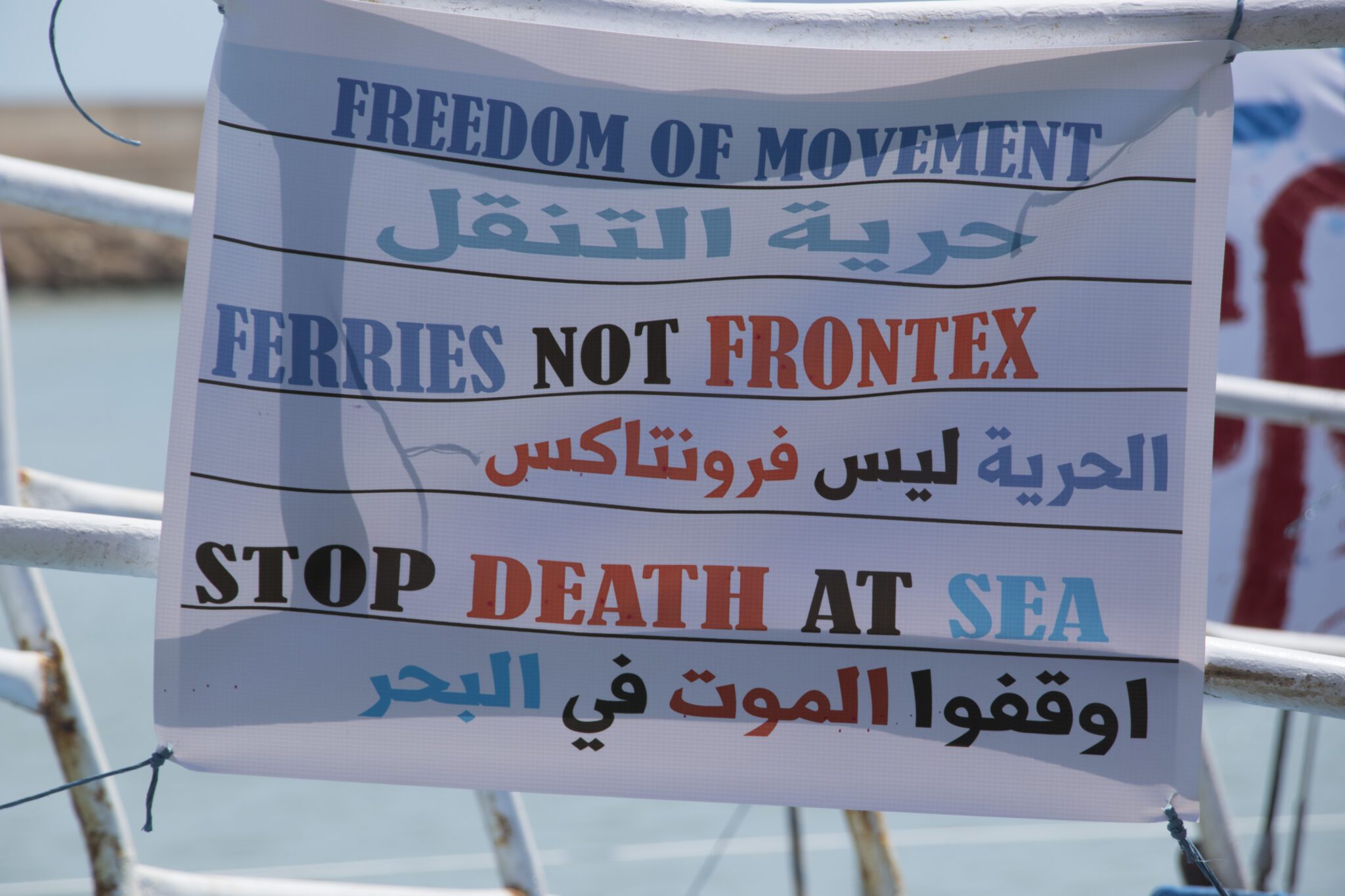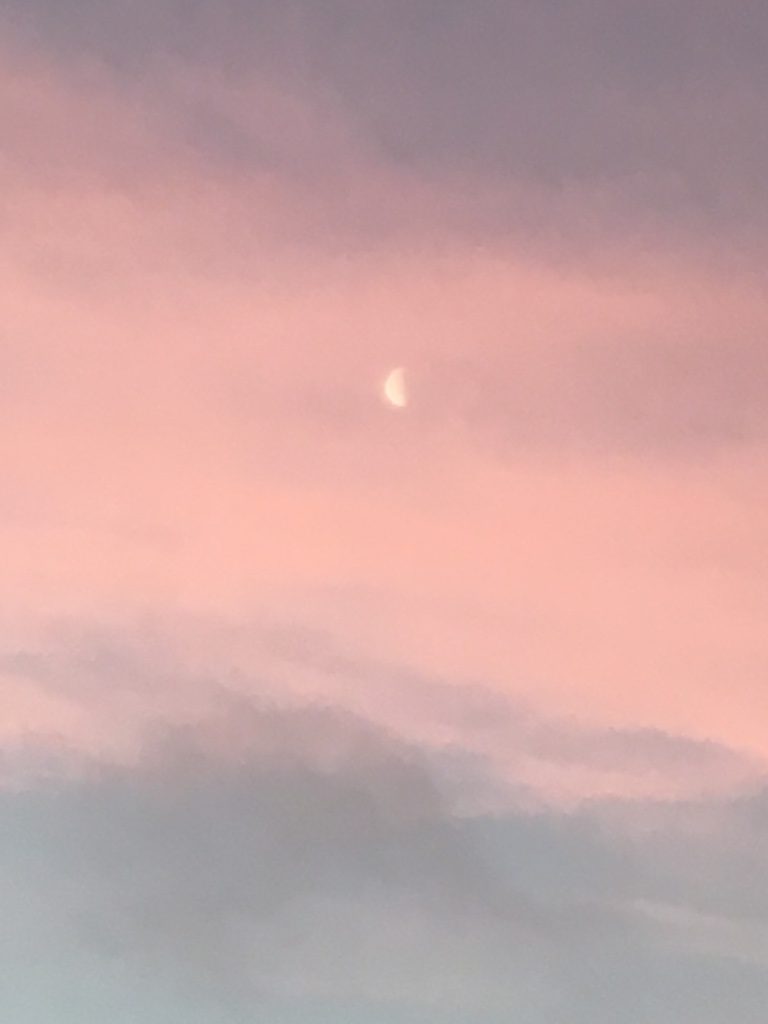Muhammad al-Kashef
(This article Co-written with the help and efforts of other Alarm phone members)
What is required to be able to intervene when people fleeing across the Mediterranean are at risk of drowning? This question was asked by a number of activists from different countries when more and more boats with refugees sank in the autumn of 2013. The answer was the Alarm Phone initiative, a 24-hour telephone line that since 2014 has contributed to a large number of emergency rescue efforts at sea. In parallel, they have also conducted advocacy work for a solidarity-based European border policy. Muhammad al-Kashef, one of the network’s founders, tells the story of Alarm Phone together with several activists.
“Everything is possible, everything can be transformed by strong social movements! Through our Alarm Phone project and during these incredible years of continuous struggles for freedom of movement, we learned this lesson once again. We cannot call our project a success because it only shows how many people need help in the Mediterranean!”, co-founder of Alarm phone, Hagen Kopp said.
How did it all start?
“Out in the entire Mediterranean Sea, during our preparation process we could hardly imagine how to make effective use of our hotline in the Aegean area. Illegal push-backs by Greek coastguards are daily practices and while discussing this issue with refugees who had directly experienced such life-threatening situations, we thought it would be impossible to develop strategies for real-time interventions to prevent these practices.”, says ”S”, one of many activists engaged in Alarm Phone.
We need to go back to October 2013 to fully understand the context in which the Alarm Phone emerged. On the 3rd of October 2013, 366 boat-refugees drowned close to the beaches of Lampedusa, yet another catastrophe that could have been easily prevented by means of adequate rescue provisions at sea. The deaths of ten thousands caused by Europe’s policies of deterrence in the Mediterranean in the past two decades are, by now, known facts throughout the world.
Refugees and migrants who, following the Arab Uprisings, crossed the sea with a newly won sense of confidence, had been able to publicly denounce the refusal of Frontex and NATO vessels to offer assistance in situations of maritime distress. After the shipwreck on the 3rd of October 2013 close to the Italian island, the dead did not disappear in the waves of the sea as they so often do. The bodies had to be recovered and were laid out for everyone to see. Fortress Europe and its policies of deterrence that were already under pressure following reports of non-assistance in distress situations, were further eroded through the circulation of these images. Merely eight days later, the next catastrophe followed: On October 11, more than 250 people drowned, after crying for help for hours. The majority of these were Syrian refugees.
However, to no avail. Despite numerous SOS calls, documented by the Italian journalist Fabrizio Gatti and based on accounts of survivors, assistance was knowingly withheld. Through the online monitoring platform Watchthemed.net the situation of distress and non-assistance was re-constructed in detail. We were able to document precisely how rescue measures were delayed for more than five hours due to quarrels between Maltese and Italian authorities over who was responsible for conducting a rescue operation. In these hours of senseless inaction, an Italian frigate was merely 40 nautical miles away, fully equipped for situations of mass distress at sea, even carrying a helicopter. Nonetheless, the Italian and Maltese coastguards did not order the frigate to intervene. It was only when the refugee vessel capsized that they launched an operation. For the activists of Watch-The-Med, this case was a key moment, raising various questions: What would have happened if these people in distress and systematically ignored by coastguards, had the option to call an independent hotline?
“An independent Phone-Hotline?”, Hagen asks himself. “Would it be possible to document distress calls in real-time and to amplify them through immediate appeals to the public? Would this allow us to move beyond the reconstruction of maritime tragedies and towards real- time interventions? There were various technical and organizational challenges to overcome: Would we be able to create an emergency phone-line for boat-people, following existing call centre structures and systems? Could we construct a network and collective structures to run a hotline 24/7, that would enable us to immediately generate public pressure in several European countries and in those around the Mediterranean Sea? It took us nearly an entire year to prepare, test and start-up the Alarm Phone.”
Zaid says, “These news were killing me a hundred times a day, as soon as I learned from my comrades that there was an intention to establish a hotline to receive calls from people in distress crossing the sea, I decided without thinking twice to join that project, I hoped it would be a temporary solution until the states do their duty and hold their responsibilities.”
In that year, Mediterranean Sea migration transformed tremendously, hardly anticipated by either migration researchers or the resistance movements’ own political experiences. The unexpected Arab Uprisings in 2011 that had swept away dictators but then faltered in particular regions under the bombs and terror of militias, implicated a struggle over migration. The amount of boat-people in the Central Mediterranean Sea, between Egypt – Libya and Italy grew dramatically during the year of 2014, despite catastrophic shipwrecks, prompting a historic transformation: boat- refugees and migrants contested Fortress Europe from the South. All those EU plans of containment, including the decade-long debate over the creation of EU detention camps in Libya, became obsolete.
In 2014, and in light of the quickly rising number of boat-people in the Central Mediterranean Sea, the EU decided to reduce rescue missions at sea, thereby setting the course for an “international refugee crisis”. Rescue operations would cease to operate in the death zone around the El-Bouri offshore oil rigs, in the international waters before the West-Libyan coast. The second half of 2014 came in absolute numbers and also in terms of the death rate – the proportion of the drowned in light of the total number of boat-refugees – the bloody culmination in the history of flight through the Central Med. It was in this context that about 60 activists began to operate the alarm phone on the 11th of October 2014.
After 7 years of running the hotline, we can certainly conceive of our project as the result of the highly technological migration struggles within and beyond Europe. We emerged in the interwoven political struggles by refugees and anti-racist European networks and campaigns. Tools such as satellite- and smart-phones, online maps and digital hand-books were appropriated as crucial elements of flight support. “Our individual and collective multilingualism is not a subculture anymore, but it is part and parcel of transnational transformations around the Mediterranean Sea”, Mourad says.
In 2015, about 120 members actively ran the hotline. Members situated between Oujda and Marseille, Tangier and Amsterdam, Tunis and Berlin, and as of today more than 200 members all over the 3 continents. We came together spontaneously, as those who are both, indignant and inventive. We communicate daily with those who left war behind only to face the danger of drowning. We also speak to national rescue agencies, to activists of smaller or rather established private rescue initiatives, and to journalists of the mass media on a daily basis.
“Our voices are not shaped by party political rhetoric or discourses in the media – we speak the language of those who confront Fortress Europe at the risk of their lives. We discovered through our practices that we are not alone with our initiative and have connected with other groups from which we might differ in certain respects. As the Alarm Phone network, we reach tens of thousands of refugees and migrants on the other side of the Mediterranean Sea and it may be that thousands of lives were rescued through the Alarm Phone in the past years”, Sofia says.
What a work shift might look like (made-up scenario based on interviews with activists)
A quick coffee and a deep breath. In 15 minutes, my old-fashioned cell phone will miraculously change into the Alarm Phone. I open up all information channels – Instagram, Facebook, Twitter, Email, WhatsApp, Signal, Telegram, Viber, Imo. I inform two migrant networks about the current WhatsApp number for the next eight hours and get in contact with my back-up, the second shift team member. As she is some 700 kilometres away, we stay in contact via the internet. Next, I check the logbook in the Alarm Phone’s forum and start a new report.
7:04 in the morning. The phone rings. The test call from the previous shift comes in. The phone works. No open cases to take over. They wish us a calm shift. 20 minutes later a WhatsApp message comes in. A member of an Afghani Family forwards a Turkish cell phone number and a GPS position. A boat with 45 people in the Aegean Sea. My back-up confirms that the coordinates point to a position north of Lesbos, unfortunately still in Turkish territorial waters, around 8 km off Lesbos Island. We map their position by using the Watchthemed.net homepage.
We call the given number. It’s busy. We wish to find out more about the situation before calling the coast guard. Did they call the coastguard already? Does the engine still work? Is water entering the boat? What is their current position? How many women and children are on board? We send them WhatsApp messages in English and Arabic. The phone rings. A German number. Hopefully not a journalist. No, it’s another member of the Alarm Phone network who informs us about a new case. Details follow via email containing a Thuraya satellite phone number and the following information: 80 persons left Libya nine hours earlier and their rubber boat has started to lose air. While my back-up keeps on trying to reach the Turkish number, I call the Thuraya number. It works straight away. The connection is surprisingly good. The Harraga (the boat migrant) speaks English, but I hardly understand him due to loud voices in the background. He hastily inundated me with all kinds of information. I try to calm down – both of us – and to sort things out. Eventually he passes the coordinates on to me. Before hanging up we agreed that I will call him back in ten minutes. They are some 120 km off the coast of Zuwara/Libya. As the Italian coastguard is not yet informed, I called them. In between my back-up has charged their Thuraya phone with more credit.
Subsequently, we wrote an email to MRCC Rome and Malta, forwarding the same information. A copy is also sent to UNHCR Italy. Unfortunately, according to Vesselfinder and Marine Traffic, there are no vessels near the people in distress. The private rescue vessels Phoenix, Bourbon Argos and Dignity I are on the way to their ports and Sea-Watch is already involved in a rescue operation. No military ships of Frontex are around. After exactly ten minutes I called the boat again. I try to keep track of the report in the logbook. No news from the Turkish number. Hopefully they were not attacked by masked men. The logbook is still not fully updated as the phone rings again. A Moroccan number. A test call from a French-speaking person. He checks if the Alarm Phone is really working. I wish him good luck and send him a link to the safety-at-sea flyer from the Watchthemed.net website.
Just a couple of minutes later another call from a Moroccan number. A person on a zodiac, tired and exhausted. He does not know about their exact position, but they left from Malabata at midnight. He expects to be close to Tarifa. It’s about 30 km from Malabata to Tarifa or 5 hours in a zodiac – without any currents. The ferry takes one hour. Each day it crosses 12 times. He asks us to call the Spanish coastguard. There were eight people and their boat started to drift as the engine had stopped working. Just when the back-up calls the Spanish coastguard to alert them, the Thuraya number off Libya’s coast calls back. They repeat their demand for help. I do my best to prevent them from panicking and repeat several times to remain calm and seated, especially once another boat approaches them. Besides, I update their position. Short update from the back-up: the Spanish coast guard was friendly and promised to do their best. This time, MRCC Rome is less friendly. Before being able to give the new coordinates, the officer asks me for personal details: who am I, who do I work for, where am I calling from. Finally, he accepts the coordinates but categorically refuses to give any information about ongoing operations: “This is a one-way only information hotline.” I called the Thuraya number once again. An operation is ongoing but It may still take hours. My back-up reached the Turkish number. Finally! In a conference call, one of our Arabic translators tells us that the travellers had reached Lesbos on their own. Great! We send them a link to the updated brochure “Welcome to Greece!” in Arabic on w2eu.info.
We call back the boat close to Tarifa. Slowly they are becoming more desperate as they are hungry, thirsty and freezing. Still, they wait. What else to do? A rescue operation, especially in these weather conditions, might take some hours. We call the boat between Libya and Italy. Nobody did show up yet, no small exploring boat, no helicopter. The boat starts drifting, coordinates do not change substantially. We call the Maltese coastguard. Maybe they are more generous in giving information to us than MRCC Rome. They know the case, but claim the coordinates are wrong. We are puzzled. That’s impossible. We consider raising a bigger alarm, to scandalize the coastguards’ inactivity, to contact journalists and organizations, to spread the news. First, we look for other means of rescue. There is a cargo ship in the vicinity. We call the ship-owner’s company. They refuse to give us the crew’s number and refuse to even tell us if their ship is involved in a rescue operation. Still, they promise to react to every SOS call, unlike other commercial ships that disconnect and hide away. We will keep track. Supposedly arbitrary tracks close to ‘our’ boat will point to a SAR operation. We called the Moroccan number again. Voices in the background, the connection interrupts. We can’t reach them again. They are possibly being illegally ›pulled back‹ by the Marine Royale. If they are intercepted, we will have to make sure that the migrants are released soon from Tangier Med and not brought to Oujda or to some place in the desert. We try to reach them regularly.
In the meantime, we see that the cargo ship has changed its course. We call the Thuraya number. We can’t reach them anymore. The batteries are probably flat. It’s unpleasant to wait. It will take some more hours to get an unofficial confirmation that they have been rescued and are on their way to Augusta. With the other travellers we have more luck. We reach them finally. They are happy and thank us a million times. The Spanish coast guard rescued them. BOZA!
Our political stance and relationship to the media
It positively surprised us how willingly the media reported on Alarm-phone ideas concerning the freedom of movement and the abolition of borders that stop people from going where they need or want to be. It was as if there was finally space to talk about these as actual possibilities to seriously consider, and journalists were interested to hear more about it. Besides Alarm-phone, there were also a few social scientists that promoted this idea in the media in the same period, which complemented our story in a nice way, and vice-versa. Another key topic was on how border controls force people to find other routes, which will always be more lengthy, costly, and dangerous than the shorter routes that are now blocked.
Alarm-phone pointed out that by blocking the safer routes, European policies and practices are directly responsible for human suffering and death. The project came across many journalists who were mainly interested in sensationalist stories, rather than in serious political points of view. How an Alarm Phone shift works but also how the members feel during and after shifts have often been in focus in the interviews, at the expense of the political messages we want to convey.
“The print media, however, always tended to disappoint us as the discourses there were mostly formulated around the ‘heroes working from the kitchen table’ narrative and offered just a few sentences at the end of the piece that covered Alarm-Phones critical political angle. We preferred media coverage that discussed the foundation of this huge violation of human rights.” Charles Heller says, “But on the plus side, even if the media focused merely on describing the work of the Alarm-Phone, it did create a sense of action perspective, as it showed people that it is actually not that difficult to intervene and to start doing something against the ugly reality we face now.”
As for Maurice “A topic that was nearly always discussed in the interviews was our ambiguous relationship to coastguards. We need them to answer our calls, take our information, not to hang up on us and answer our questions regarding cases. Obviously, they feel watched by us and would prefer not to be called and monitored.”
The coastguards operate in a political and conflicting context; on the one hand they should rescue lives in distress but on the other hand they control the borders of the EU, seeking to block the entry of certain migrants as much as possible. “For the moment we know that the more the practices of border authorities are watched, the greater the chances that necessary rescues are carried out and conform to international law and basic humane standards.” Charles says.
Another issue that was often raised revolved around the idea that Alarm-Phone project might stimulate unwanted migration, often voiced in a slightly accusatory tone, suggesting that the project might even be supporting the work of human smugglers. These questions actually made the interviews more interesting as the members could then explain that migration is nothing new and there is nothing wrong with it. What is wrong is the fact that for some people in this world, migration, whether temporary like holidays or more long term, is as usual as waking up in the morning, while for others it is completely impossible or involves great risks. Even with the Alarm-Phone and all the other solidarity initiatives that exist, it is still a nightmare to take a boat to Europe, full of dangers and including all the extreme difficulties that follow upon arriving on European soil.
These talks have given us the opportunity to explain that European politicians’ focus on smugglers as criminals is a misleading strategy that we should not fall for. “Addressing this topic gave us the opportunity to explain the fact that European politicians’ focus on smugglers as criminals is a strategy of deception that we should not fall for. It is the European policies that create this situation in the first place and smugglers would not exist if there were open passages. Politicians falsely flex their muscles by blaming the smugglers and distract the public by attacking would-be smuggler boats.” Lorenzo says “The question that would always follow in reaction to our answer was: ‘What if the borders are open, and everybody comes to Europe, how are we supposed to handle that?’ Here we would provide various arguments and explanations: Not everyone will come to Europe; history, research and simple common sense can show us that. Europe has enough space and plenty of wealth to share. And on top of that it would be very cynical to let people die because we are afraid of what would happen if we would not let them die. We will not deny that changing existing systems.”






